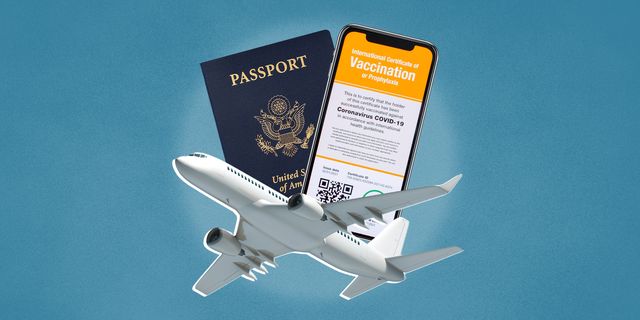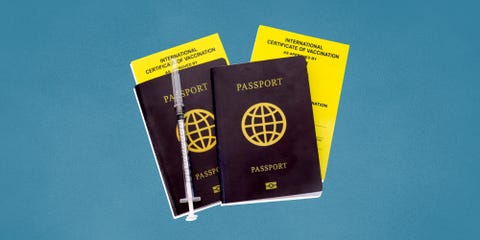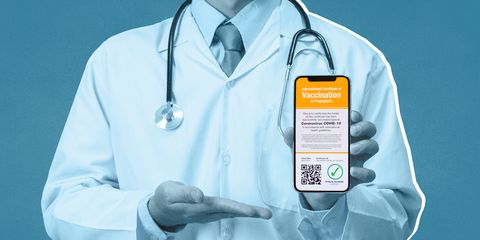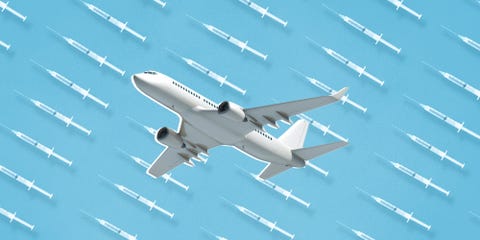Not yet. But it doesn't mean you won't be able to travel. Here's what you should know.
FEB 5, 2021

All of us who travel in Africa have for years kept tucked into our passports a tattered yellow booklet titled "International Certificate of Vaccination or Prophylaxis," approved by the World Health Organization. While the "yellow card," as it is colloquially known, has space for many shots and the dates they were administered, the only entry in mine—and in the certificates of most frequent travelers these days—is yellow fever. (Mine is dated 2008, and the last time I needed to produce it was in 2019, to obtain a visa for Ghana, one of the 17 African countries that currently require it for entry.)
That yellow card is the old-school, analog version of what all of us desperate to travel once again have been dreaming of since December 11, 2020: the day the FDA issued its first emergency use authorization (EUA) for the Covid-19 vaccine developed by Pfizer-BioNTech. (And subsequently for Moderna's vaccine.)
The dream is a digital health passport that would announce to the world that we have been vaccinated against Covid-19 and are therefore good to go—something we could brandish to board planes and cruise ships, cross borders, check into hotels, and be exempted, as well, perhaps, from tests and quarantines.

Call them what you will—"Covid certificates," "immunity passports," "digital health passports," "freedom passes"—they have quickly become (before they have even been developed) the Holy Grail of the age of Covid. The golden ticket to life as it once was, enabling us not just to travel freely, but to attend events, send children to in-person schools, see family—just live.
The digital health passports are the Holy Grail of the age of Covid. The golden tickets.
They are the dream, too, of travel agents, tour operators, cruise lines, hotel companies, and tourism boards, who are all as desperate to get the business of travel going again (and to keep both their customers and their employees safe) as we are to travel (and to feel safe doing so). Greece, for example, whose economy depends heavily on tourism, has taken the lead in lobbying the European Commission, the EU's executive body, to move quickly to prepare a "framework" for vaccine certificates that would be accepted by all member states, as both London's Sunday Times and Voice of America reported recently. Israel, which leads the world in percentage of population already vaccinated, is working on what it calls "green passports," which free those vaccinated from most restrictions, according to the Jerusalem Post.
Many companies in both the travel and the tech world are developing such digital passport prototypes. One can go down a rabbit hole on this: Google, Microsoft, and Apple are all developing their own versions. The mobile hotel booking app Sidehide and Onfido, the global identity verification and authentication company, have announced that they are developing a "passport" that would quickly and safely verify an individual's immunity status when booking a hotel on Sidehide's site. The Daily Telegraph reported last week that Boris Johnson's government is funding at least eight different prototypes for vaccine passports (although there are "no plans" for a rollout yet).
The tech giants are all developing their own versions. The airlines are all over it.
The airlines are all over it: JetBlue, Lufthansa, Swiss International Airlines, United Airlines, American Airlines, Virgin Airlines, and Cathay Pacific, among others, have announced that they are soon to start testing on certain flights the digital passport from a Swiss nonprofit called CommonPass, backed by the World Economic Forum, which lets people "document their Covid-19 status," including health declarations, PCR tests, and vaccinations. Early entrants in the field included ICC AOKpass, launched by the International SOS, and the Danish-government sponsored CoronaPass. The International Airline Transport Association, says it is in the final stages of developing its own mobile app, IATA Travel Pass, which will store your health information. China will likely have its own version. The gold rush is on. There is money to be made, and travel—with its enormous economic impact—to be enabled. (For context, recent data from the World Travel and Tourism Council indicate that the restrictions on travel caused by the pandemic have taken $4.7 trillion out of global domestic product just in 2020.)
"It makes sense that those in the travel industry are especially focused on creating such digital health certificates," observes Henry Harteveldt, president of Atmosphere Research Group, a travel industry analyst. "The pandemic started, after all, because infected people traveled from point A to point B. And while some applications appear to be travel-specific, others are being developed with travel in mind but may serve multiple purposes." (Ticketmaster, for example, is reportedly working on its own version, to help revive the big, in-person events industry.)

All of us who travel in Africa have for years kept tucked into our passports a tattered yellow booklet titled "International Certificate of Vaccination or Prophylaxis," approved by the World Health Organization. While the "yellow card," as it is colloquially known, has space for many shots and the dates they were administered, the only entry in mine—and in the certificates of most frequent travelers these days—is yellow fever. (Mine is dated 2008, and the last time I needed to produce it was in 2019, to obtain a visa for Ghana, one of the 17 African countries that currently require it for entry.)
That yellow card is the old-school, analog version of what all of us desperate to travel once again have been dreaming of since December 11, 2020: the day the FDA issued its first emergency use authorization (EUA) for the Covid-19 vaccine developed by Pfizer-BioNTech. (And subsequently for Moderna's vaccine.)
The dream is a digital health passport that would announce to the world that we have been vaccinated against Covid-19 and are therefore good to go—something we could brandish to board planes and cruise ships, cross borders, check into hotels, and be exempted, as well, perhaps, from tests and quarantines.

Call them what you will—"Covid certificates," "immunity passports," "digital health passports," "freedom passes"—they have quickly become (before they have even been developed) the Holy Grail of the age of Covid. The golden ticket to life as it once was, enabling us not just to travel freely, but to attend events, send children to in-person schools, see family—just live.
The digital health passports are the Holy Grail of the age of Covid. The golden tickets.
They are the dream, too, of travel agents, tour operators, cruise lines, hotel companies, and tourism boards, who are all as desperate to get the business of travel going again (and to keep both their customers and their employees safe) as we are to travel (and to feel safe doing so). Greece, for example, whose economy depends heavily on tourism, has taken the lead in lobbying the European Commission, the EU's executive body, to move quickly to prepare a "framework" for vaccine certificates that would be accepted by all member states, as both London's Sunday Times and Voice of America reported recently. Israel, which leads the world in percentage of population already vaccinated, is working on what it calls "green passports," which free those vaccinated from most restrictions, according to the Jerusalem Post.
Many companies in both the travel and the tech world are developing such digital passport prototypes. One can go down a rabbit hole on this: Google, Microsoft, and Apple are all developing their own versions. The mobile hotel booking app Sidehide and Onfido, the global identity verification and authentication company, have announced that they are developing a "passport" that would quickly and safely verify an individual's immunity status when booking a hotel on Sidehide's site. The Daily Telegraph reported last week that Boris Johnson's government is funding at least eight different prototypes for vaccine passports (although there are "no plans" for a rollout yet).
The tech giants are all developing their own versions. The airlines are all over it.
The airlines are all over it: JetBlue, Lufthansa, Swiss International Airlines, United Airlines, American Airlines, Virgin Airlines, and Cathay Pacific, among others, have announced that they are soon to start testing on certain flights the digital passport from a Swiss nonprofit called CommonPass, backed by the World Economic Forum, which lets people "document their Covid-19 status," including health declarations, PCR tests, and vaccinations. Early entrants in the field included ICC AOKpass, launched by the International SOS, and the Danish-government sponsored CoronaPass. The International Airline Transport Association, says it is in the final stages of developing its own mobile app, IATA Travel Pass, which will store your health information. China will likely have its own version. The gold rush is on. There is money to be made, and travel—with its enormous economic impact—to be enabled. (For context, recent data from the World Travel and Tourism Council indicate that the restrictions on travel caused by the pandemic have taken $4.7 trillion out of global domestic product just in 2020.)
"It makes sense that those in the travel industry are especially focused on creating such digital health certificates," observes Henry Harteveldt, president of Atmosphere Research Group, a travel industry analyst. "The pandemic started, after all, because infected people traveled from point A to point B. And while some applications appear to be travel-specific, others are being developed with travel in mind but may serve multiple purposes." (Ticketmaster, for example, is reportedly working on its own version, to help revive the big, in-person events industry.)
Should you make travel plans thinking you might have a health passport in hand by summer? No. While the steady drum beat of coverage makes it feel right round the corner, it isn't. This does not mean that you cannot travel if you need or want to. It just means that even as more and more of us are vaccinated, we still cannot lower our guard for the foreseeable future. We will still need to take precautions—wearing masks, distancing. The end may well be in sight; but there's no digital golden ticket yet.
Here's what you should know.
There are technological challenges to overcome.
All the different platforms being developed need to speak to one another, or else they will be useless in an international setting. "Developing them will be an iterative process," Harteveldt cautions—as it was for the smart-phone. "Some prototypes will emerge. There will be a first model, then a second and third model. You can't hope for perfection out of the gate. Several main players will emerge. There might be product testing groups. Only a couple of players will cross the finish line."
In short, we are in the pilot stage.

There are privacy issues.
We live in a world of frequent security breaches and rightful concerns about sharing data—and especially health data. Whatever platforms are developed as digital receptacles of your health status must be, as Harteveldt points out, "formidably stable and secure, capable of keeping the bad actors out." A tremendous amount of testing is required, as is a platform where all that is visible to others is your Covid-19 status—nothing else.
Privacy concerns go hand in hand with ethical ones. Privacy activists in the European Union are sounding alarms in the face of Greek lobbying (supported by Spain, Belgium, and Hungary) for a cross-border health passport. Such a document, they argue, would endanger the fundamental rights of Europeans by categorizing them according to their health status—from where it's a slippery slope (Reuters referred to it as "mission creep") to denying all manner of public services to the unvaccinated, in effect weaponizing health the way ethnicity and race have been historically weaponized and used as bases for discrimination. Inequalities between the haves and the have-nots would be exacerbated. France has already ruled out health passports. Late last year, reports Politico, Wojciech Wiewiórowski, the EU's data protection czar, called the immunity passport "extreme."
Your mother-in-law has to be able to use an immunity passport without having to call you about it.
There are usage conundrums.
A digital health passport "has to be mindless for us to use," says Harteveldt. "Think about the enormous diversity of people traveling—young and old, poor and rich, healthy and disabled, tech savvy and not at all. Your mother-in-law has to be able to use it without having to call you about it."
And accommodation will have to be made for people who do not have smart phones. Just in the U.S. alone, he says, "Eight percent of airline passengers don't have them. So paper will have to be accepted all around the world for at least a five-to-seven-year horizon. And paper certificates are subject to forgery."
So what, meantime, should you do?
Still mask up and social distance. As the fact sheet you are given at vaccination centers states clearly at the top, in bold letters: "You should still wear a mask and practice social distancing, even if you have received 2 doses of the vaccine." (These are CDC recommendations.) It is our best shot at staying safe, and at keeping others safe, too.

The Biden administration is stepping up vaccine production and distribution. "By March and April, we will have a lot more people vaccinated," says Bruce Y. Lee, professor at CUNY Graduate School of Public Health and Health Policy and executive director of PHICOR, its public health research center. "And we will be seeing more and more data. The weather will be in our favor—it will be warmer and more humid, conditions the virus does not like. Even more so in June and July. And there will be another vaccine on its way—Johnson & Johnson's. It's designed to be a one-dose vaccine. This could mean fewer doses to produce and distribute to complete vaccination for the same number of people and alleviate some bottlenecks. Its interim trial results have just come out."
There are optimistic signs already from the travel industry—even without a Covid-19 digital passport at the ready.
"In the past week and a half, I've received four requests from clients wanting to go to either Florida or the Caribbean in early to middle of March," Martin Rapp, senior vice-president at the international travel agency Altour, told me on January 27. "And two others who want to book Europe in June and August. We don't know yet what the various countries will be doing vis-a-vis the actual vaccinations: Will travelers still have to quarantine? Will they have to take tests? And of course we will all still be wearing masks and socially distancing. But based on my clients and those of several other agents, I can say with some certainty that each month through the end of 2021, as people complete their vaccinations, will see more and more of them traveling. And I think that in 2022 we will see a return to our new normal. I think that the vaccines have psychologically opened up the floodgates already, giving people permission to actually get on a plane and travel with relative safety."
Traveling with "relative safety." If that turns out to be true, and not a dream, that's not bad. In this world, not bad at all.
No comments:
Post a Comment